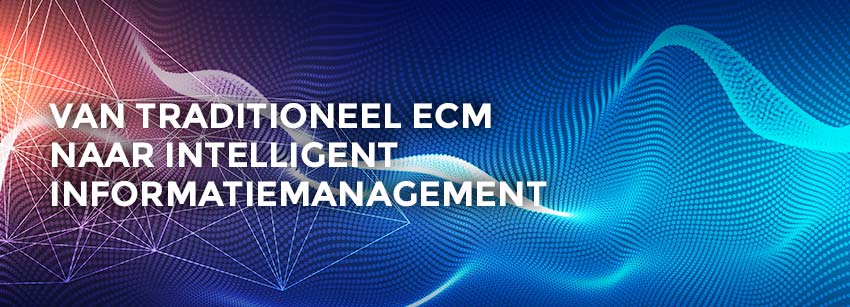2016 was an important year for enterprise content management (ECM). In December, Gartner's annual conclusion was that the term 'ECM' is being retired and replaced by so-called 'Content Services'. In my view, even this term does not cover it and it is time for a more forward-looking term: Intelligent Information Management.
Gartner literally says: "ECM is now dead (kaput, finite, an ex-market name), at least in how Gartner defines the market. It's been replaced by the term Content Services."
As you might imagine, the discussion around these industry terms and the death of 'ECM' was the central topic during AIIM17.
The discussion around this ECM topic is usually nothing new. If I received a Euro every time I annually concluded that 'ECM' is not a perfect term or that it is more a strategy to pursue than a description of a technology sector, I would be a rich man.
'Retiring the term ECM' does not mean that the need for the capabilities disappear, nor that everyone has to jettison their ECM approach and associated systems. It does mean that the term ECM no longer covers all the 'content-y' issues that keep people busy.
At its core, industry vendors provide solutions and strategies that help end-user organisations manage the interaction between people, processes and technology. How this interaction is managed evolves along with how technology evolves. In my opinion, there are at least three overlapping types of information management that play an active role in the market:
Document Management & Workflow - originated around 1995
- People: Solutions are difficult to use and require a lot of training. Users are often specialists.
- Processes: The focus is on automating content-intensive, complex, business-critical processes at mainly large organisations
- Technology: Complex, customised and expensive implementations. Purchased by Business Buyers.
Enterprise Content Management - originated around 2005
- People: The focus is shifting from ECM 'specialists' to knowledge workers, but usability is still not a top priority.
- Processes: ECM believes it is an enterprise-wide layer, but is often actually driven by indvidual departments. Information silos pound out of the ground.
- Technology: Emergence - and then decline - of 'suites'. Sharepoint is disrupting the traditional ECM market.
Mobile and Cloud Content Management - emerging around 2015
- People: Usability is becoming priority number one. The distinction between home and office is starting to disappear.
- Processes: 'Appification' of processes. Consumer solutions that are 'good enough' are popping up in the SME market.
- Technology: Configuration, connection and mobile capabilities are becoming important. File sync & share and cloud solutions are shaking up the market.
In my opinion, all this is clearly more than what traditional ECM stands for, especially in its narrow and more traditional, transaction-centred definition. However, I think this label no longer really describes the challenges and strategies that organisations have. Especially as the market continues to shape itself towards big data, automation and analytics. It is precisely these themes that create added value for companies.
In my view, the Intelligent Information Management definition suffices best.
This definition evoked many reactions, but could be traced back to the following two questions:
- Why 'Information Management' instead of 'Content Management'?
- What is meant by 'Intelligent'?
After a few false starts, we are finally in the age of 'Information Management'. This new world is all about data AND content, rather than data or content. In the past, we have had to deal with a dichotomy between data management and content management. If this dichotomy was ever useful at all, as time goes by, the usefulness is only diminishing. Solving customer-centric challenges requires competences and technologies from both the data management and content management worlds.
Intelligent Information Management can be described in a number of things. I will mention a few below.
'Intelligent' means finally realising that the delusion of just one content repository for everything was indeed a delusion. Consolidation and simplification, yes. Removing and replacing business-critical content systems, with the aim of getting everything in one central place, is no longer for most organisations.
'Intelligent' means that companies care much more about what something is (A contract? An invoice? An RFP?), than where it is stored.
'Intelligent' means that companies need information management tools that are easy to use, deployable without much 'IT involvement' and easy to integrate into daily processes.
'Intelligent' means that not every business process is a huge, consisting of millions of documents, straightforward process (in other words, an ECM process). But all these more simple day-to-day processes are still information-intensive. Automating these processes is still a critical prerequisite for business digital transformation.
'Intelligent' means that information management requirements differ by process and application. The market wants to buy specific capabilities and not a giant 'total suite' that owns everything, including redundant capabilities. It is dated 'ECM thinking' to overcome everything with a monolithic system.
'Intelligent' means that metadata management is becoming increasingly important as a core initiator of all the above.
Being able to conduct Intelligent Information Management requires an application that incorporates these six 'Intelligent' approaches. M-Files offers companies this added value. It is not for nothing that M-Files is the fastest growing information management system in the world. Are you curious to see what this looks like in practice? I will be happy to organise a live online demonstration of M-Files and show you what added value M-Files can create for your organisation. Register for the online demonstration, which is completely free of charge.
Bastiaan Brefeld
Manager Business Development
bastiaan.brefeld@geone.nl

